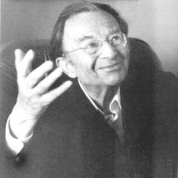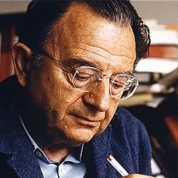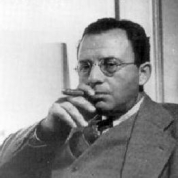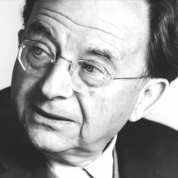Erich Fromm
Erich Seligmann Fromm (March 23, 1900 – March 18, 1980) was a German social psychologist,psychoanalyst, sociologist, humanistic philosopher, and democratic socialist. He was associated with what became known as the Frankfurt School of critical theory.
...
Fromm extolled the virtues of humans taking independent action and using reason to establish moral values rather than adhering to authoritarian moral values.
...
According to Fromm, the awareness of a disunited human existence is a source of guilt and shame, and the solution to this existential dichotomy is found in the development of one's uniquely human powers of love and reason. However, Fromm distinguished his concept of love from unreflective popular notions as well as Freudian paradoxical love.
...
Fromm considered love to be an interpersonal creative capacity rather than an emotion, and he distinguished this creative capacity from what he considered to be various forms of narcissistic neuroses and sado-masochistic tendencies that are commonly held out as proof of "true love." Indeed, Fromm viewed the experience of "falling in love" as evidence of one's failure to understand the true nature of love, which he believed always had the common elements of care, responsibility, respect, and knowledge.
...
Fromm also asserted that few people in modern society had respect for the autonomy of their fellow human beings, much less the objective knowledge of what other people truly wanted and needed.
...
Fromm believed that freedom was an aspect of human nature that we either embrace or escape. He observed that embracing our freedom of will was healthy, whereas escaping freedom through the use of escape mechanisms was the root of psychological conflicts. Fromm outlined three of the most common escape mechanisms: automaton conformity, authoritarianism, and destructiveness. Automaton conformity is changing one's ideal self to conform to a perception of society's preferred type of personality, losing one's true self in the process. Automaton conformity displaces the burden of choice from self to society. Authoritarianism is giving control of oneself to another. By submitting one's freedom to someone else, this act removes the freedom of choice almost entirely. Lastly, destructiveness is any process which attempts to eliminate others or the world as a whole, all to escape freedom. Fromm said that "the destruction of the world is the last, almost desperate attempt to save myself from being crushed by it"
...
Erich Fromm postulated eight basic needs:
Relatedness
Relationships with others, care, respect, knowledge.
Transcendence
Being thrown into the world without their consent, humans have to transcend their nature by destroying or creating people or things. Humans can destroy through malignant aggression, or killing for reasons other than survival, but they can also create and care about their creations.
Rootedness
Rootedness is the need to establish roots and to feel at home again in the world. Productively, rootedness enables us to grow beyond the security of our mother and establish ties with the outside world. With the nonproductive strategy, we become fixated and afraid to move beyond the security and safety of our mother or a mother substitute.
Sense of Identity
The drive for a sense of identity is expressed nonproductively as conformity to a group and productively as individuality.
Frame of orientation
Understanding the world and our place in it.
Excitation and Stimulation
Actively striving for a goal rather than simply responding.
Unity
A sense of oneness between one person and the "natural and human world outside."
Effectiveness
The need to feel accomplished.
Six orientations
Fromm also spoke of "orientation of character" in his book Man For Himself, which describes the ways an individual relates to the world and constitutes his general character, and develops from two specific kinds of relatedness to the world: acquiring and assimilating things ("assimilation"), and reacting to people ("socialization"). Fromm considers these character systems the human substitute for instincts in animals. These orientations describe how a man has developed in regard to how he responds to conflicts in his or her life; he also said that people were never pure in any such orientation. These two factors form five types of malignant character, which he calls Receptive, Exploitative, Hoarding, Necrophilous and Marketing. He also described a positive character, which he called Productive.







